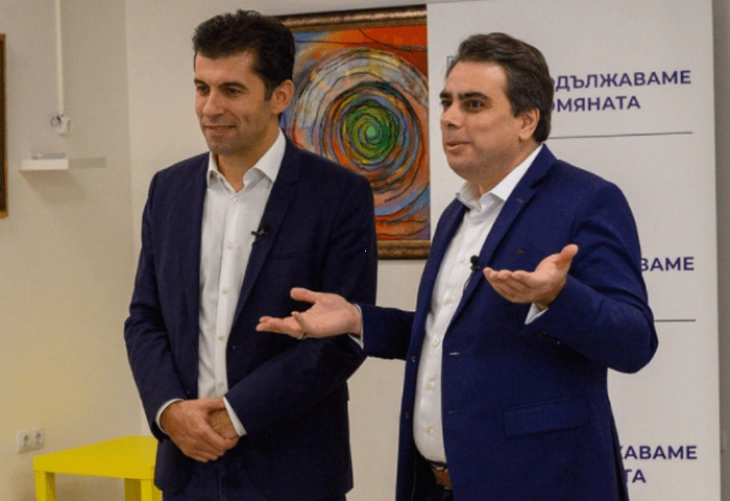Bulgaria voted for changes, it depends on the 'Harvard Duo' if there'll be any

Sofia, 16 November 2021 (MIA) – Bulgaria has voted for changes and a more decisive battle against crime and corruption, but whether it’ll be enough to finally form a political government with a strong parliamentary majority to back it up remains to be seen.
According to the Bulgarian Central Election Commission, the surprising winner of the Sunday's elections is the party of the new stars of the Bulgarian political sky - the duo Kiril Petkov and Asen Vasilev from “We Continue the Change”. Why is this surprising? Because every pre-election survey was in the favor of GERB, Boyko Borisov’s party, and the Harvard Duo was in second and third place, racing against BSP. Ultimately, “We Continue the Change” was the undisputed winner with 25.65% of votes, beating GERB’s 22.80%. Surprisingly, BSP dropped to #4, having only won 10.26% of votes, lagging behind DPS’s solid 12.92%. The biggest loser of these elections is July’s winner, Slavi Trifonov’s party “There is Such a People”, which only won 9.52% of votes. Democratic Bulgaria came in sixth, with 6.34% of votes.
The snap elections on Sunday, the third parliamentary elections within seven months in Bulgaria, have shown that the political stratification of the already divided Bulgarian society has pretty much stayed the same.
Concerns remain that it’ll be hard to form a political government this time too, even though on Monday, alongside the great number of resignations given by leaders of parties that didn’t get the expected amount of votes, it started becoming louder and clearer that there is a willingness for the parties that were considered as protest or change parties to overcome their differences, vanities, desires, and back the likely future PM Kiril Petkov in an attempt to turn the Bulgarian society towards the desired changes, reforms, and the fight against crime and corruption.
If Petkov and Vasilev fail to form a government, and GERB as the runner up with no chances of forming a coalition with a change party, except for possibly DPS, which isn’t enough for a majority, then Bulgaria is facing a fourth round of elections as soon as possible – which only means a deeper political crisis and a prolonging of the technical government’s mandate, if current President Rumen Radev wins in the second round of the presidential elections this upcoming Sunday.
That’s why Bulgaria needs to stay pragmatic and focused. It needs a wide consensus for a parliamentary and government coalition which will need to bring the necessary normative novelties for a realistic implementation of changes in the country.
The socialists were the ice breakers. According to the executive board member, Ivan Chenchev, they will probably change their current attitude of not speaking to parties who want changes in Bulgaria, trying to coordinate their program with the programs of Petkov’s winning party and other change-focused parties.
Chenchev commented on the expected running of Petkov as PM that his demands match the BSP’s demands to fulfill the people’s expectations. He added that the BSP doesn’t care about the ministers’ names and positions, it cares about policies and having the programs be so close together they find a way out of the crisis. He highlighted pensions and healthcare as the BSP’s lawmaking priority. The BSP will not participate in negotiations with GERB and DPS, Chenchev added.
Mustafa Karadayi, leader of DPS (Movement for Rights and Freedoms), the DPS can talk to every party and coalition in the Bulgarian Assembly equally, adding that the DPS got better results this round than in April and June.
President Rumen Radev announced on Monday that he will schedule a session of the new 47th Assembly as soon as possible, as soon as the new MPs names get announced. He’s hopeful that the Bulgarian parties will overcome their differences in the name of their mutual future, and that they will have a stable majority. The victory of “We Continue the Change” brings hope and opportunities, Radev believes.
He also says that the battle to strengthen the country is nowhere near over, calling to all Bulgarian citizens who want to live in a dignified, modern Bulgaria to come out and vote so that the changes are irreversible.
The day after the elections, once all facts and voting numbers were determined, leaders or notable individuals from the losing parties resigned. Atanas Atanasov, leader of Democrats for a Strong Bulgaria, alongside his coalition partner Hristo Ivanov of Democratic Bulgaria, resigned after their coalition Yes, Bulgaria! won only 6.34% of the votes.
Kristian Vigenin, president of the National Election Headquarters of the BSP, the party which ended in 4th place with little over 10% of the votes, losing a few additional percent from the election results at the last count in July, resigned as well. The BSP’s internal resistance against its leader Korneliya Ninova is becoming more intense, with requests on social media, and probably in the party structures themselves, for her to follow in Vigenin’s footsteps.
Sashko Dimevski
Translated by Dragana Knezhevikj







